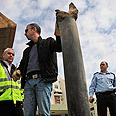
Southern residents: No one taking responsibility
Qassam rocket hits western Negev on Sunday afternoon. South's residents forced to return to life under daily rocket attack – with no response from IDF, accuse politicians of exploiting transition period to new government to avoid taking care of situation. 'I feel like an actor in a tragedy,' says one resident
A Qassam rocket fired from the Gaza Strip on Sunday afternoon was believed to have landed between the Sha'ar Hanegev and Ashkelon Coast regional councils in southern Israel. At least 66 rockets and mortar shells have been fired at Israel since the end of Operation Cast Lead.
A resident of the Gaza vicinity communities said on Sunday after hearing the government's promises to respond to the recent rocket fire attacks raining down on Israel's southern towns over the weekend, "In another week, a new government will take power and no one wants to take responsibility for providing a response (to the rockets)."
"We are in a twilight zone," said Haim Perry, general secretary of Kibbutz Nir Oz, which even after Operation Cast Lead continues to sustain unending rocket attacks from the Gaza Strip.
"There is a breach in the decision making mechanism, mainly in taking responsibility for what is going to happen," he added.
Prime Minister Ehud Olmert declared Sunday during the cabinet meeting, "The State of Israel has a broad range of actions that it can take. This range of actions will be exhausted until complete quiet is brought to the south."
However, many of the residents living in Gaza vicinity communities and in the western Negev sense the military's deadlock. According to them, promises of this sort are easy to break, especially when responsibility is soon to be handed over to someone else as a new government is instituted.
"I think that we need to respond," said Shlomo Ben-Shushan, chairman of Beersheba's municipal parents' organization. "Operation Cast Lead was not finished, and evidence of this is that they (Hamas) are still firing rockets. The fact that rockets haven't reached Beersheba doesn't mean they won't. However, as far as the government is concerned, the operation is over and they aren't doing anything."
"I believe that we will see another Grad (missile) or two in Beersheba. I fully hope that nothing will happen, but we are playing with our luck. Beersheba is also in range (of the rockets being fired), and we need to act as if we can be slammed by a rocket at any moment," he added.
'Back to the same old story'
Paula Kantori, a resident of Shokeda, a town in the Eshkol Regional Council, also feels as though the military operation in Gaza has yet to be concluded. "With all the pain entailed in doing so, they (the military) needed to stay there. In my opinion, we as residents withstood the rockets extraordinarily. So we expect the government and the military to continue to take care of us," she claimed.
According to her, the residents live with no sense of security in light of the IDF's anemic response to the rocket firings.
"In the first days that saw rocket fire from Gaza, I was scared. But afterwards, when the operation began, we felt safe, that someone was protecting us. Now we don't have that feeling anymore. We are back to the same old story. We we left, we said we would respond to the first Qassam. Today we have already reached the 100th Qassam," she recounted.
"I feel like an actor in a tragedy, where the stage is the southern region," said Yagil Yavin, a resident of Nir Yitzhak, a town in Eshkol Regional Council.
He expressed his hope that the IDF's response to the rockets will change with the change in administration. "I don't blame anyone – the situation is problematic. There is a post-election deadlock. I just hope that this period is as short as possible."










